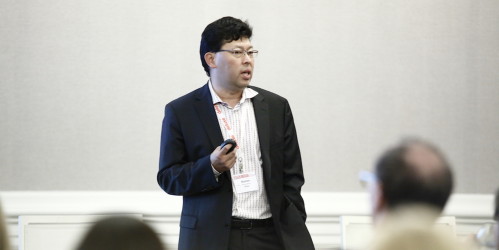
Reltio CMO: Companies Must Shift to More Reliable, Data-Driven Applications (HITS)
Media, entertainment and other companies need to move to more reliable, data-driven applications along the lines of Facebook, Google and LinkedIn, according to Ramon Chen, chief marketing officer for data management company Reltio. Speaking at the Hollywood IT Society’s (HITS) recent “Holly-wired: Where IT and Entertainment Meet” event in Los Angeles, Chen said that for a company to drive in the right direction with its data, it must move away from today’s enterprise data, which is all too often “siloed,” inconsistent and unreliable. Chen pointed to Facebook, Google and LinkedIn as the data-driven “gold standard” that companies should strive for. Most people feel like those three companies, for the last 10 years, have “changed the way we feel” about using applications, he said. “We may not know it, but Facebook and LinkedIn … have trained us to use” their apps on a daily basis, in part because their apps and search engines are “very intuitive” and the information they provide is “very valuable.”
As examples of their value, he pointed to how LinkedIn allows us to better network while looking for a new job, while Facebook allows users to share their experiences. “But nobody said ‘hey, here’s a tutorial – go learn how to use LinkedIn” or Facebook, he said at the conference, adding that those social networks are easy to learn how to use.
In stark comparison, employees are looking at the enterprise applications they are typically saddled with and finding they are difficult to use and not helping them as much as they would like, he said.
Facebook, LinkedIn and, to some extent, Google are all “data-driven” applications and the data they offer tends to be “reliable,” although that reliability tends to rely on the “good will” of people being honest and updating their personal information, he said. LinkedIn’s reliability is community-driven because people share their references and endorsements, so if somebody posts a fake profile, it’s “not going to be validated or verified by other real people that are in the system,” he said. As a result, “there’s kind of a community enforcement of reliable data, so you can trust it to a certain degree.”
LinkedIn users also like that social network because it provides only information that is relevant to them, including job listings in their fields of expertise and interest, as well as suggestions for people to connect with who may be helpful to their networking and job-seeking efforts, he said. LinkedIn is, therefore, constantly helping its users. Similarly, Google points out to users restaurants that their friends visited that they too may like.
In comparison, traditional enterprise applications merely wait for users to take some action, such as entering information or asking for a report, he said. “The new wave of data-driven business applications are going to start helping you,” just like the consumer applications of Facebook, Google and LinkedIn, he predicted.
But in order to do that, they need reliable data, relevant insights and recommended actions — and everybody wants things faster now than they ever did also. Fortunately, modern data management is able to provide reliable data at scale, said Chen.
“Facebook and LinkedIn have showed us the way,” so all data that is needed now can be kept in one pool instead of being siloed off in separate data systems like in the past, he said.
Many executives have been spending a lot of money on data that’s not terribly useful, he said. “The scary thing is there’s no governance and the data may be unreliable. So these people are making multimillion-dollar business decisions based upon data that could be incorrect,” he said. For example, some companies have only spent money on IT infrastructure that yielded complex tools and integration to manage data, but no business apps.
At the same time, other companies have only spent money on applications and analytics that leave users digging for insights in unreliable data, he said. The results have been siloed, one-off solutions, disjointed IT and business efforts, and a slow response to company objectives, he said.
The “new foundation” for data collection, which Facebook, Google and LinkedIn have shown the way on, is to take the traditional “schemas” that companies have used and move them towards a new system that is operational and analytical, as well as expandable to allow more data to be added in the future, he said.
But Chen cautioned against companies rushing to make hasty changes to their data systems. “It’s a gradual evolution,” he said. Companies “can solve a business problem, deliver a business app to the business user, and gradually move your data into this” new framework, he concluded.
